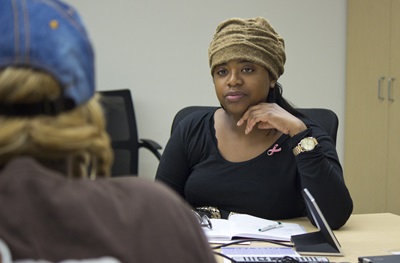
Merium Burwell finds the emotional and psychological support of the Legacy Program just as important as chemo, surgery or the first round of radiation.
As part of her homework assignment in elementary school, my daughter “interviewed” my mom and wrote a story about how my parents met. My mother told her that when my father – the “new guy” in town – asked her out, she initially turned him down. But that didn’t deter him. They started dating and ultimately he put his fraternity pin on her hospital gown while she was recovering from having her appendix removed. Twenty years later, I still cherish the story, but it is one I would not have known had my daughter not asked.
The Legacy Program, launched earlier this year by Penn Medicine’s Abramson Cancer Center (ACC), seeks to do the same: help patients tell their own stories that they can share with loved ones. The monthly sessions are for patients who have received a cancer diagnosis, either recent or years past, “It’s not just for individuals with a certain stage of cancer,” said Sandra Blackburn, MSW, who created the program with Laura Kotler-Klein, MSS, DSW, social work coordinator, and Matthew Stevenson, LCSW, the mental health therapist for the ACC. “Writing a legacy is good for everyone – a time to take stock of your life, set goals.”
Each session starts with introductions and a sharing of feelings, using the “Feeling Wheel” to help participants more accurately reflect emotions. The wheel’s hub contains six broad categories of feelings (mad, sad, scared, peaceful, powerful, and joyful) and from there, the wheel expands into wider circles of words, each linked to one of the center terms. “The wheel gives a better voice to the mood they’re in,” Stevenson said. “It also helps center us as a community. We are united by the openness of sharing in that moment.”
Leading the group is Deborah Burnham, PhD, associate undergraduate chair in the department of English at the University of Pennsylvania. Burnham, who also leads the ACC’s Writing a Life program, provides prompts to inspire writing and keep the session focused . For example, one prompt came from a quote which warns that if you don’t let people into your life – to know the real you – “you are going to have a tiny little life and probably be very angry on your deathbed that you missed something.” What, Burnham asked the participants, has happened to you or been given to you that kept your life from being tiny? Participant Merium Burwell wrote a poem about the situation between her, her sister and niece. “When I was diagnosed, I was not speaking to them but my brother said you have tell your sister. So I did. And that conversation got us talking,” she said. “My cancer has helped me mend so many relationships and opened up new conversations.”
”I want them to write what’s on their minds,” Burnham said.
Participants spend about 30 minutes writing – in silence – and then regroup to share. “We’ve heard amazing stories, often about grandparents,” Stevenson said. “Maybe some never told before.”
Sharing – which is completely voluntary – often becomes a bonding experience. “You always connect with the audience. Everyone can identify,” Burwell said. “There’s someone who will listen to you, can hear and understand you, cry with you, laugh with you, pray with you. We relate to each other’s joys and sorrows, pains and hopes for a tomorrow.”
Although the writing is based on prompts, sometimes discussions veer from the original topic, with one person’s story leading to someone else’s. For example, the group started talking about how difficult it sometimes is for family or friends to know what to say – or do – for a loved one battling cancer. Participants shared small acts of kindness that made the biggest impact on them during these times. One person, who has remained in remission for decades, recalled that her long-time friend sent her a card with a dime in it. “This was back when there were things called payphones and you needed a dime to make a call!” she said, smiling. “The card said ‘I’m in for the long haul with you.’ I remember that most.”
Another woman told the group that her family always went with her to chemo treatments. She never was alone. “I realized how many people have no one. I’ll be grateful for my family’s support for the rest of my life.”
Laughter is definitely a part of these sessions but so can be sadness or anger. The prompts have helped participants release unresolved bad feelings or anger, which Stevenson said is good. “It’s a release that they may not be able to experience in another setting,” he said, noting that at least one social worker is always available at the sessions for a private talk with a patient if needed.
Burwell, who has always used creative writing to express deep emotions but was initially worried about going to a program that was led by a university professor, now calls the sessions “a blessing. I wondered would it be boring? Too much like school? I didn’t know what to expect. ” But, in fact, she said, it was the complete opposite. “We are a composite of brothers and sisters who have gone through cancer, which the outside world can’t understand,” Burwell said. “People want you to hear them and understand what’s on their minds or why sometimes they can’t articulate thoughts, feeings and emotions when anxiety takes over. It’s a different level of communication when you have cancer.”
Helping a person emotionally or psychologically, she continued, “is just as important as chemo or surgery or that first round of radiation. The whole person must be treated holistically.”
To learn more about the Legacy Program or to register, contact Blackburn at 215-662-6968 or sandy.blackburn@uphs.upenn.edu.